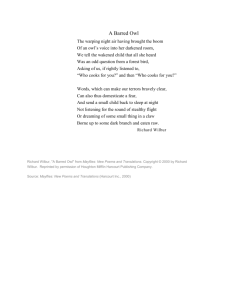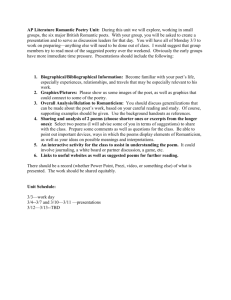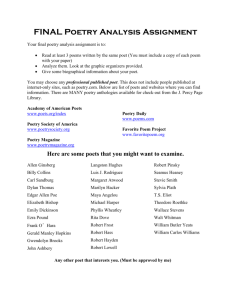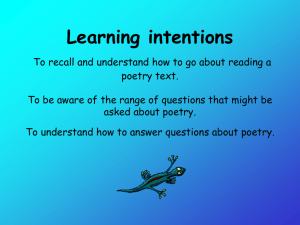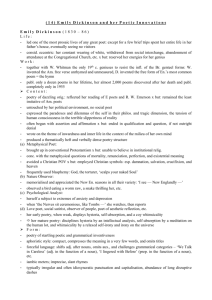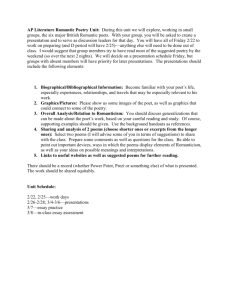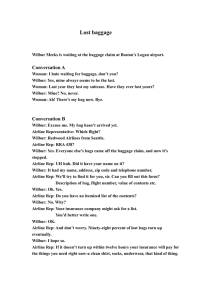Richard Wilbur
advertisement
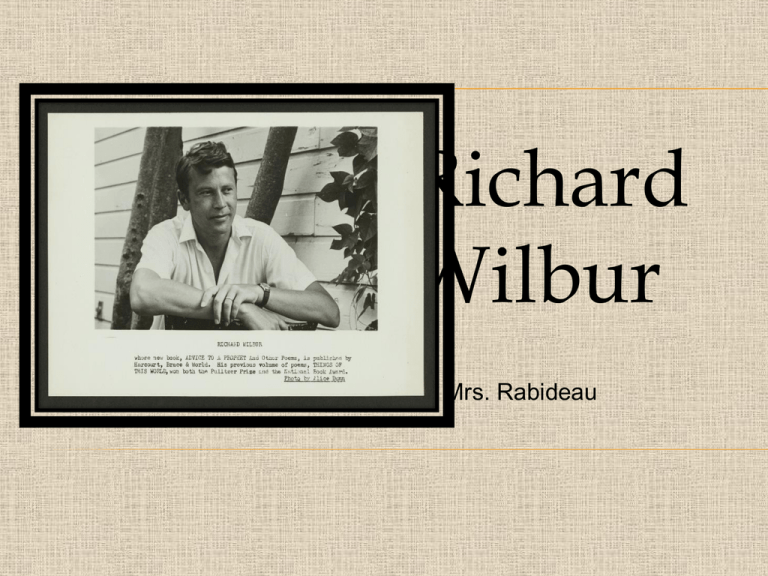
Richard Wilbur By Mrs. Rabideau THE LIFE OF A POET • • • • Richard Wilbur was born in NYC on March 21st, 1921. He studied at Amherst college.“As a student at Amherst College in the early 1940s, Wilbur wrote stories, editorials, and poems for his college newspaper and magazine.”poetryfoundation.org He then served as a soldier in WWII. When he returned home, he used poetry to make sense of his world. “One does not use poetry for its major purposes, as a means to organize oneself and the world, until one’s world somehow gets out of hand.” He later attended Harvard University. HIS LIFE CONTINUED… His first book of poems was published in 1947 – The Beautiful Changes and Other Poems He has translated numerous French plays as well as poetry. “About Wilbur's poems, one reviewer for The Washington Post said, ‘Throughout his career Wilbur has shown… enviable variety. His poems describe fountains and fire trucks, grasshoppers and toads, European cities and country pleasures. All of them are easy to read, while being suffused with …verbal music…” - www.poets.org He tends to write in celebration of life despite the darkness he had experienced in war. “I feel that the universe is full of glorious energy,…that the energy tends to take pattern and shape, and that the ultimate character of things is …good. I am perfectly aware that I say this in the teeth of all sorts of contrary evidence, and that I must be basing it partly on temperament and partly on faith, but that’s my attitude.” poetryfoundation.org He was admired by Robert Frost and Wallace Stevens. They even became good friends. By the late 1950s he won a Pulitzer Prize for his third book of poetry. “Since then, Wilbur has received nearly every award and honor available to an American poet, including two Pulitzers, two Bollingen Prizes, a National Book Award, and the office of the U.S. Poet Laureate.” http://www.kwls.org/littoral/the_world_is_fundamentally_a_g/ “A poem comes looking for me rather than I hunting after it.” In 2009, he taught a poetry class at Amherst. This class was focused on his writing contemporaries such as Sylvia Plath, Elizabeth Bishop and Robert Lowell. “It’s going to be difficult for me to turn myself into a considering, evaluative teacher of the works of people I knew so well, so personally.” http://www.kwls.org/littoral/the_world_is_fundamentally_a_g/ He is currently alive and well at the ripe age of 93! In her room at the prow of the house Where light breaks, and the windows are tossed with linden, My daughter is writing a story. I pause in the stairwell, hearing From her shut door a commotion of typewriter-keys Like a chain hauled over a gunwale. Young as she is, the stuff Of her life is a great cargo, and some of it heavy: I wish her a lucky passage. But now it is she who pauses, As if to reject my thought and its easy figure. A stillness greatens, in which The whole house seems to be thinking, And then she is at it again with a bunched clamor Of strokes, and again is silent. I remember the dazed starling Which was trapped in that very room, two years ago; How we stole in, lifted a sash THE WRITER And retreated, not to affright it; And how for a helpless hour, through the crack of the door, We watched the sleek, wild, dark And iridescent creature Batter against the brilliance, drop like a glove To the hard floor, or the desk-top, And wait then, humped and bloody, For the wits to try it again; and how our spirits Rose when, suddenly sure, It lifted off from a chair-back, Beating a smooth course for the right window And clearing the sill of the world. It is always a matter, my darling, Of life or death, as I had forgotten. I wish What I wished you before, but harder. WORKS CITED www.poets.org www.poetryfoundation.org http://www.kwls.org/littoral/the_world_is_fund amentally_a_g/


